What is a mathematician?
For me this is a simple question. For students, this is quite tricky.
What is a mathematician?
At the start of every school year, for the past 8 or so years, I have given this question to each of my classes within, the first few days of the school year.
The assignment is two-fold.
- I want to know what they think of math. Who does math? What does a mathematician look like? How does a mathematician think?
- Their ELA teacher and I gain an understanding of their writing at the start of the year.
I hand the paper out and I ask them what a mathematician is, does, and what do you think a mathematician looks like. They are asked to use the top part to draw me a picture of a mathematician and use the lines to write me three sentences telling me what they think.
As you can imagine, some students are looking around dumb-founded and not knowing what I'm looking for. Some students ask me, "What's a mathematician?" I reply, "Sweetie, that's what I'm asking you. Look at the word and see if you can use your prior knowledge or connections to tell me what you think."
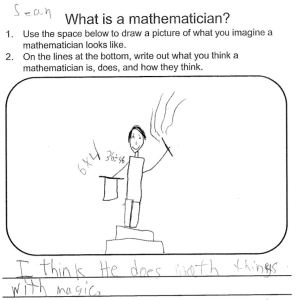
This assignment is NEVER for a grade, but just a way for me to see how they feel about math in general. About half of the time students draw pictures of Albert Einstein or a scientist. The other half of the students draw a picture of a classroom with a teacher at the board and students in desks. The teacher is the only one with the text bubble by their head talking. When the students write about what a mathematician they say things like, "a person who does math fast" or "a person who does math all the time."
Take a look at some examples from over the years.
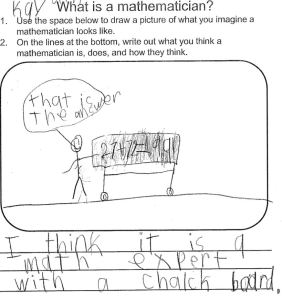
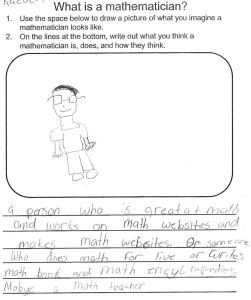
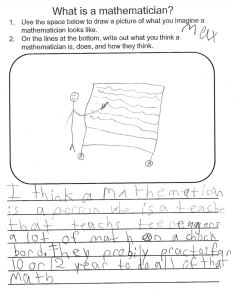
Only after a week or so of me encouraging them to think like mathematicians, to talk like mathematicians, and listen like mathematicians. Giving them examples of what I may be thinking or how I answer questions with the language I choose do they start to get it. I tell them that they are each mathematicians and they look at me like I have 3 heads. When I explain that a mathematician is simply someone who studies math, they look around and shake their knowingly. When I say that my goal by the end of the year is that they can look in the mirror and see themselves as a mathematician I have achieved my goal. They shake their heads and smile by this point.
Throughout the entire school year they hear me say things like,
"Great job thinking like a mathematician!"
"You're doing a terrific job talking like a mathematician!"
"When you look in the mirror what do you see?" Their response, "A mathematician!"
No matter what level our students are at they need to believe they can do math. They need to believe they can continue to grow and achieve. We need to model what mathematicians do, which is being a PROBLEM SOLVER. To be a problem solver we need to show and teach our students how to be problem solvers.
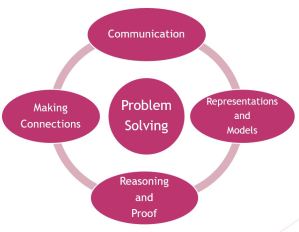
By the end of the year we want our students to think of themselves as mathematicians. In order to see how my student view themselves, I give them the same exact assignment again, hoping they draw a self-portrait and see themselves as mathematician.
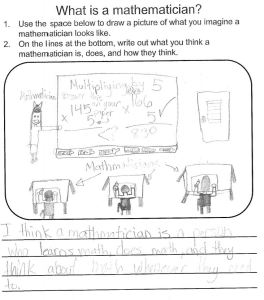
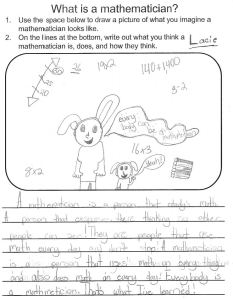
My daughter and her friend, both 2nd graders answered this question for me as I am sitting here writing it out. Their response are:
- Daughter: "A mathematician is someone who is really good at math and knows a lot. They memorize the numbers and put them together in their head. They think by looking at the numbers and adding and subtracting all of the answers in their head."
- Daughter's friend: "A mathematician is someone who knows a lot of math and helps lots of people do math and they think math-like. Some problems they use math in them."
When the girls finished, I asked them if they wanted to see a real life mathematician. They both excitedly said, "Yes!" I turned them toward the window and they saw their reflection. They both smiled huge smiles and said, "I see me." I asked them, "Do you do math? Do you explain or show your thinking? Do you make connections to what you already know when solving something new? Can you solve a problem in multiple ways?" When they smiled and said, "Yes, I show my work." I told them they were mathematicians and they both puffed their chests a little bit and stood a little taller. They felt good!
The same exact thing happens with students in your classroom!!!
This assignment is not limited to elementary. I'd be interested to see what middle school and high school students put when they get the same exact assignment. If you have your students complete this assignment, please let us know how it goes! We LOVE hearing how your students do on the activities we share with you!